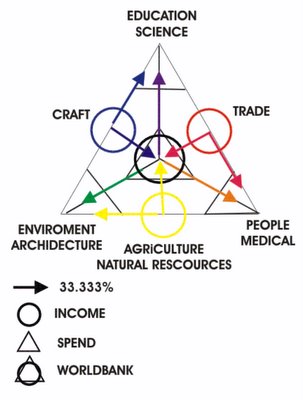BALANCED ECONOMY
 Savings: 0.001%
Savings: 0.001%An economy that is not ecologic is not economic.
On the side: Most so called third World Countries are currently highly indebted with the Worldbank, other institutions, companies and Countries.
Most of these debts were accumulated shortly after being "freed" from colonization.
On the other side:If some good lawyers took heart these Countries, could sue the responsible Countries, companies, institutions and banks for the debts they amassed during the time of colonization. Of which, till today none of these Countries, companies, institutions and banks ever made retribution, or if, in ridiculously small amounts, which don´t deserve the name and cut a deal that all debts from the past are nill now, on all sides.
On the otherother side: The responsible Countries, companies, institutions and banks could call them selves lucky, if this would come to pass.
CUD2005
Not speaking here of the debts resulting from Neoliberalism.
colonies KEY NOUN: pl. colÂ?oÂ?nies
A group of emigrants or their descendants who settle in a distant territory but remain subject to or closely associated with the parent country.
A territory thus settled.
A region politically controlled by a distant country; a dependency.
A group of people with the same interests or ethnic origin concentrated in a particular area: the American colony in Paris.
The area occupied by such a group.
Colonies The British colonies that became the original 13 states of the United States.
A group of people who have been institutionalized in a relatively remote area: an island penal colony.
Ecology A group of the same kind of animals, plants, or one-celled organisms living or growing together.
Microbiology A visible growth of microorganisms, usually in a solid or semisolid nutrient medium.
ETYMOLOGY: Middle English colonie, from Latin colnia, from colnus, settler, from colere, to cultivate; see kwel- 1 in Indo-European roots
sue VERB: sued , suÂ?ing , sues VERB: tr.
Law
To petition (a court) for redress of grievances or recovery of a right.
To institute proceedings against (a person) for redress of grievances.
To carry (an action) through to a final decision.
To court; woo.
Obsolete To make a petition to; appeal to; beseech. VERB: intr.
Law To institute legal proceedings; bring suit.
To make an appeal or entreaty: "I sue for grace, and thou deny'st me" (Francis Quarles).
To pay court; woo.
ETYMOLOGY: Middle English sewen, from Anglo-Norman suer, from Vulgar Latin *sequere, to follow, from Latin sequ; see sekw- 1 in Indo-European roots
re?spon?si?ble (r-spns-bl) KEY ADJECTIVE:
Liable to be required to give account, as of one's actions or of the discharge of a duty or trust.
Involving personal accountability or ability to act without guidance or superior authority: a responsible position within the firm.
Being a source or cause.
Able to make moral or rational decisions on one's own and therefore answerable for one's behavior.
Able to be trusted or depended upon; reliable.
Based on or characterized by good judgment or sound thinking: responsible journalism.
Having the means to pay debts or fulfill obligations.
Required to render account; answerable: The cabinet is responsible to the parliament.
ETYMOLOGY: Obsolete French, corresponding to, from Latin respnsus, past participle of respondre, to respond ; see respond OTHER FORMS: re?sponsi?ble?ness (Noun), re?sponsi?bly (Adverb) SYNONYMS: responsible , answerable , liable , accountable , amenableThese adjectives share the meaning obliged to answer, as for one's actions, to an authority that may impose a penalty for failure. Responsible often implies the satisfactory performance of duties or the trustworthy care for or disposition of possessions: "I am responsible for the ship's safety" (Robert Louis Stevenson). Answerable suggests a moral or legal responsibility subject to review by a higher authority: The court held the parents answerable for their minor child's acts of vandalism. Liable may refer to a legal obligation, as to pay damages or to perform jury duty: Wage earners are liable to income tax. Accountable especially emphasizes giving an account of one's discharge of a responsibility: "The liberal philosophy holds that enduring governments must be accountable to someone beside themselves" (Walter Lippmann). Amenable implies being subject to the control of an authority and therefore the absence of complete autonomy: "There is no constitutional tribunal to which [the king] is amenable" (Alexander Hamilton). See also Synonyms at reliable.
ridiculous riÂ?dicÂ?uÂ?lous (r-dky-ls) KEY ADJECTIVE:
Deserving or inspiring ridicule; absurd, preposterous, or silly. See Synonyms at foolish.
ETYMOLOGY: From Latin rdiculus, laughable, from rdre, to laugh OTHER FORMS: riÂ?dicuÂ?lousÂ?ly (Adverb), riÂ?dicuÂ?lousÂ?ness (Noun)
retribution retÂ?riÂ?buÂ?tion (rtr-byshn) KEY NOUN:
Something justly deserved; recompense.
Something given or demanded in repayment, especially punishment.
Theology Punishment or reward distributed in a future life based on performance in this one.
ETYMOLOGY: Middle English retribucion, from Old French retribution, from Latin retribti , retribtin-, from retribtus, past participle of retribuere, to pay back : re-, re- + tribuere, to grant ; see tribe
tribe (trb) KEY NOUN:
A unit of sociopolitical organization consisting of a number of families, clans, or other groups who share a common ancestry and culture and among whom leadership is typically neither formalized nor permanent.
A political, ethnic, or ancestral division of ancient states and cultures, especially:
Any of the three divisions of the ancient Romans, namely, the Latin, Sabine, and Etruscan.
Any of the 12 divisions of ancient Israel.
A phyle of ancient Greece.
A group of people sharing an occupation, interest, or habit: a tribe of graduate students.
Informal A large family.
Biology A taxonomic category placed between a subfamily and a genus or between a suborder and a family and usually containing several genera.
ETYMOLOGY: Middle English, from Old French tribu, from Latin tribus, division of the Roman people, perhaps of Etruscan origin, or possibly from tri-, three; see trei- in Indo-European roots


0 Comments:
Postar um comentário
<< Home